On a steamy summer morning in 2014 in the tiny Southern town of Cottonport, Louisiana, Steve and Missy Ducote faced the unthinkable.
Steve Ducote: I wouldn't know how to tell you. I've never felt like that before or since.
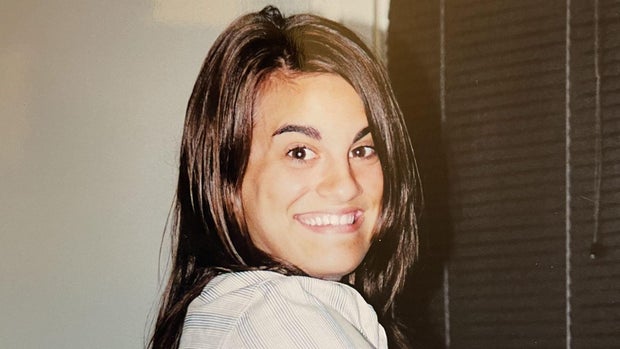
The couple found their youngest daughter Megan Parra lying on the floor of her living room.
Missy Ducote: I had no idea what was to become of all this.
The 29-year-old mother of two appeared to have been shot in the head.
Steve Ducote: It was a 357 magnum gun with the 38 caliber bullet..
Just one day earlier, Megan's parents and her husband, then-30-year-old Dustin Parra, had been dealing with the aftermath of a car crash.
Missy Ducote: Dustin called … and said that Megan had been in an accident.
Megan was alone driving down a stretch of road not far from home when she somehow careened off the road and hit a tree. Dustin grabbed their two young sons and rushed to the scene. So did Steve and Missy Ducote.
Steve Ducote: Cop said she was going about 45 miles an hour, wasn't on her phone. Had her seatbelt on.
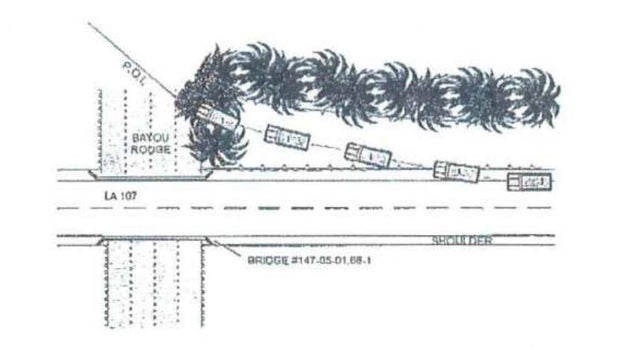
Megan had only minor injuries. But a state trooper was troubled by the fact that there were no skid marks.
Missy Ducote: He said that … she had not applied the brakes.
Steve Ducote: Cop came, and he asked me, "would your daughter want to try to hurt herself?" I said, "No, I don't think so."
But it was not clear whether Megan actually tried to stop the car. Missy Ducote says Megan told her she was distracted.
Missy Ducote: She said she had lost focus.
But Steve Ducote says Megan told him that the brakes didn't work, and that she hit that tree to avoid the river. However, the brakes were never tested. At the Avoyelles Parish Hospital where Dustin worked as a nurse, Megan was treated for a cut to her right hand. Once released, Dustin took his wife home, while Missy and Steve Ducote kept their boys overnight. The next morning, around 7 a.m., Megan sent her mother a text.
Missy Ducote: "Hi mom. Are — are the boys OK? … are you all OK?" … I called her. … And … I told her that, um when the kids would get up and I had fixed breakfast, we would … bring her breakfast and go check on her.
David Begnaud: Anything sound unusual?
Missy Ducote: Not at all.
About an hour later, Missy Ducote says Dustin called her to say that Megan was going to take a bath while he went out to fill a prescription for her at the local Walmart.
Missy Ducote: He said he would … pick up the kids on the way back. … Well, an hour has passed by and he's still not here. … and then I said … let's go, we — we need to go.
It was close to 10 a.m. when Steve and Missy Ducote arrived at their daughter's house with their grandchildren in tow. There they discovered Megan lying on the floor with blood pooling around her head.
Missy Ducote: She was still in the paper shirt from the hospital … and … underwear.
Steve Ducote: I grabbed the oldest boy. And when I leaned over to pick him up … I saw the gun kind of tucked against her leg.
Missy Ducote called her parents to pick up the kids. Steve Ducote called 911. Missy, a nurse practitioner, knelt beside her daughter and realized she still had a pulse.
Missy Ducote: She was breathing … just barely though.
Steve Ducote called Dustin.
Steve Ducote: I can't remember exactly if I told him Megan killed herself or Megan shot … herself.
Steve Ducote: And I said, "where are you?" He said, "I'm in Mansoura. I just came through the … four-way stop sign."
Dave Blanchard was the first officer on the scene.
Dave Blanchard: I entered the house, saw the victim on the floor … Mrs. Ducote … was administering first aid to the head area.
Dustin Parra arrived about 10 minutes later.
Steve Ducote: He comes running in … and he slides, and he just catches the end of the blood.
Missy Ducote: After … he slid … He got up, he pushed the gun away.
Missy Ducote says Dustin then reached into a pocket in Megan's paper shirt.
Missy Ducote: And he pulled out a picture.
It was a picture of their boys.
Dustin and Missy, both medically trained, worked to save Megan. Minutes later, paramedics arrived. That's when Blanchard began documenting the scene.
Dave Blanchard: I didn't want to interfere in them giving the first aid.
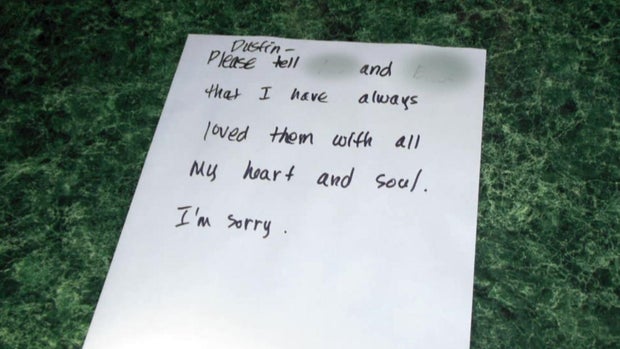
Megan was airlifted to a trauma center in Lafayette. The mayor of Cottonport drove Steve and Missy Ducote and Dustin in his car. Back at the Parra home, Blanchard continued to document the scene and collect evidence — including that gun, which belonged to Dustin; Dustin's shorts, which were bloodied from that slide; and a note, which was discovered on the kitchen counter.
Steve Ducote: It says, "tell the boys I love them. I'm sorry." That was it.
The morning after the shooting — as her parents struggled with how Megan could have taken her own life — doctors told the family they had done all they could. That is when the decision was made to take her off life support.
The next morning, Megan's organs were donated. Her body was transported to the medical examiner's office for an autopsy. That's when Dustin and the Ducotes headed for the Cottonport Police Department, to meet with lead detective Christopher Knight.
Steve Ducote: Well, Dustin went in first … he came back out, and he raised his hands and said, "I'm not a suspect." … it was kind of shocking. … Then Missy and I go in. And, you know, Chris didn't ask us a whole lot. Wasn't much of an interview.
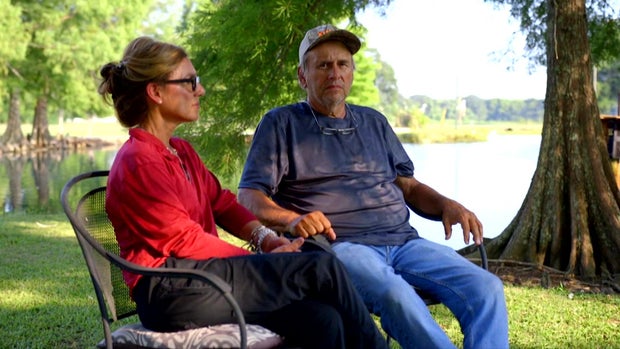
Steve and Missy Ducote say it was that day when they began to question everything about the investigation into their daughter's death. Especially when Knight handed Dustin that note, presumably left behind by Megan, and Dustin debated what to do with it.
Missy Ducote: He said, "I don't know what I'm gonna do with it. I think I'm just gonna throw it away." I said, "No, don't throw it away. We might need it later on."
The very next day, Steve Ducote says Knight showed up at his home. He had some news for him.
Steve Ducote: He says, "Mr. Steve, Megan's fingerprints were all over the gun. Dustin's were too, but it's his gun."
Steve Ducote's brother-in-law Luke Welch was there.
Luke Welch: Steve repeated to him. "So, the only fingerprints on the gun were from Megan and Dustin." And he said, "That's it. That's the only ones. End of story."
Steve Ducote: I said, "Well, she must have shot herself, then."
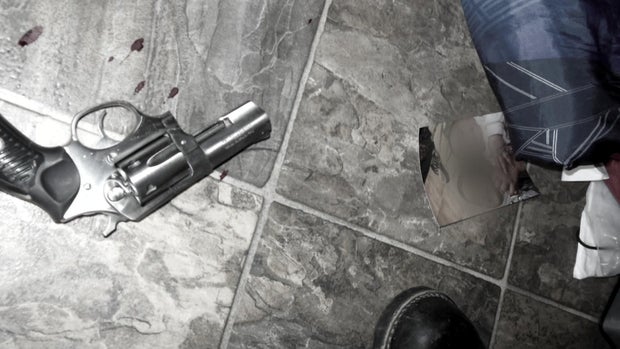
But Steve Ducote would soon learn that what he says Det. Knight told him was not true. The gun that killed Megan had not been tested at all.
David Begnaud: That was a major turn in the story.
Luke Welch: Yes. That's one of the major turns. This … thing goes 360 degrees a lot.
QUESTIONING THE INVESTIGATION
Three weeks after Megan Parra's death, an autopsy report declared her cause of death to be "a gunshot wound to the head." The manner of death was "suicide." The report said Megan tested negative for sedatives, and that the gun was in direct contact with her temple when it went off.
Betsy Jeansonne (crying): So much life to live and love to give.
Megan's uncle Luke Welch says the medical examiner confirmed Knight's theory that Megan had shot herself. Because remember, according to Knight, Megan's fingerprints were found all over that gun.
Luke Welch: With that information coming from Chris, I think there's no doubt it's a suicide.
Knight denies ever saying he tested that gun, and just four days after the shooting, he closed his investigation and summarized it in a one-page report.
David Begnaud (reading Knight's report): "According to the evidence, collected statements from family and the doctor's report, this investigation shows … Megan Parra did in fact commit suicide."
Betsy Jeansonne: The only doctor's reports we had were Lafayette General.
David Begnaud: Yeah, but Lafayette General was not doing any kind of forensic exam on her.
Betsy Jeansonne: No, no.
Jeansonne, who was pregnant with her first child at the time, says Megan had been planning her baby shower.
Betsy Jeansonne: Two days before she died, she asked me what color balloons I wanted.
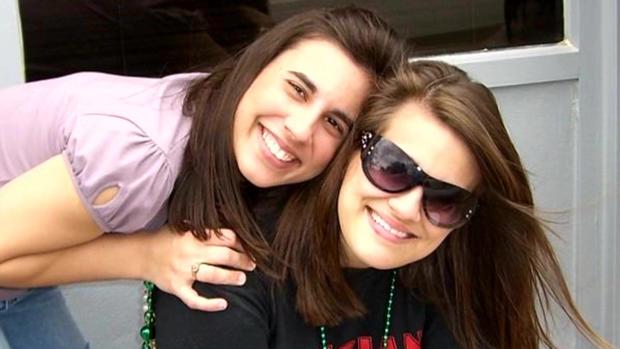
Megan was also just months away from getting a master's degree. She had her eye on becoming a school principal. Steve Ducote says the more he thought about his daughter's death, the less it made sense.
Steve Ducote: Never shot a gun. Never fooled with a gun. Wouldn't have known how to hold a gun.
He says there was also no way that Megan would have shot herself knowing that he, Missy and her boys would discover her that way.
Steve Ducote: She'd never do something like that.
But Megan was found behind locked doors, there was no evidence of forced entry. So, if she didn't kill herself, who pulled the trigger?
David Begnaud: Did you start to believe that Dustin shot her?
Betsy Jeansonne: Yes.
David Begnaud: And tried to cover it up.
Betsy Jeansonne: Yes.
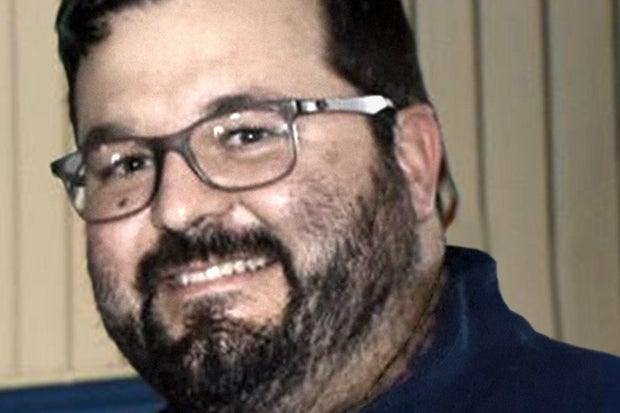
There were questions about Dustin's alibi. Jeansonne says he told three different stories to three different people about where he was when Steve Ducote called him, but according to Megan's family, Knight never resolved those conflicting stories.
Betsy Jeansonne: There were so many things that were not done.
Knight also never followed up on reports that Dustin may have been having an affair.
David Begnaud: Did Megan ever talk to you about trouble they were having in the marriage?
Betsy Jeansonne: She didn't.
David Begnaud: Did you ever ask her?
Betsy Jeansonne: I didn't. … And I feel like that's one of my biggest regrets.
Steve Ducote fears that in the days leading up to Megan's death, the couple may have been fighting. And something in the autopsy report haunted him.
Steve Ducote: It indicated she had some bruises in the abdomen and chest area.
David Begnaud: What do you think happened that morning she was shot?
Betsy Jeansonne: I think she was leaving him.
Ducote says around the time he was becoming increasingly concerned about Knight's investigation, an investigator for the District Attorney's Office told him there was no way Knight had fingerprinted that gun in just two days.
Steve Ducote: "Uh-uh Steve. It takes me, with a rush on it, about 14 days." … Then I knew.
David Begnaud: Knew what?
Steve Ducote: I knew she hadn't killed herself then.
But by then, the gun was no longer in evidence. With Knight's permission, it had been returned to Dustin.
Steve Ducote: They gave him the gun back … before the coroner ever ruled.
Ducote says he begged local authorities to just hear him out, but no one would listen. Until four months later, when a local judge agreed to help.
Dan Schaub: Steve Ducote … convinced the judge that there was something to look at.
Dan Schaub was commander of the Criminal Investigations Unit at the Avoyelles Parish Sheriff's Office. That judge asked Schaub himself to review the case.
Dan Schaub: First thing I did was uh, you know, talk to uh, Steve, see what his concerns were.
Steve Ducote: We started working on things. And, boy, he was working.
Unfortunately, says Schaub, there wasn't much to work with.
Dan Schaub: Here there was not even basic Detective 101 that was done by Chris Knight.
Schaub says his hands were also somewhat tied by Steve Ducote, who prevented him from accessing certain evidence, like Megan's cellphone.
Dan Schaub: At that point … Dustin had the cellphone, and he did not want to ask Dustin … for her cellphone.
According to Ducote, Dustin and the boys were living in Steve and Missy's house at the time —and he didn't want his son-in-law knowing they were investigating him. So, Ducote says he asked Schaub not to talk to Dustin until they had more evidence.
Steve Ducote: I wanted to be sure.
David Begnaud: Why not at least call the husband — not to go after him, but to say, hey, listen, just want to ask some questions so I can button some things up.
Dan Schaub: That's real easy. I — I did it out of respect for — for the Ducote family.
Rather than go against Steve Ducote, Schaub steered clear of Dustin Parra. Instead, he reviewed Chris Knight's one-page report – examined 115 photos taken by Officer Dave Blanchard, and he talked with two witnesses who had not been interviewed — neighbors, who each thought they heard what sounded like a gunshot that morning, but at two different times. The neighbor on the right told Schaub she heard a very loud "boom" a little after 7 a.m.. But the neighbor to the left told Schaub he was certain he heard a gunshot about two hours later.
Dan Schaub: He was still in bed, and he wasn't sure of the time. He supposed at around 9:15.
Schaub says the neighbor to the right wasn't sure if what she heard at around 7 a.m. was actually a gunshot—so he created a timeline based on what the other neighbor reported hearing. Then, the question became could Dustin have even been home at 9:15 a.m.?
David Begnaud: Dustin arrives at Walmart –
Dan Schaub: Yes.
David Begnaud: — at 8:53 a.m.
A state trooper told Commander Schaub that he saw Dustin at an intersection not far from that Walmart, just before 9 a.m. Knight never had Walmart's surveillance footage subpoenaed to verify Dustin's alibi, but Schaub found the next best evidence: a time-stamped receipt.
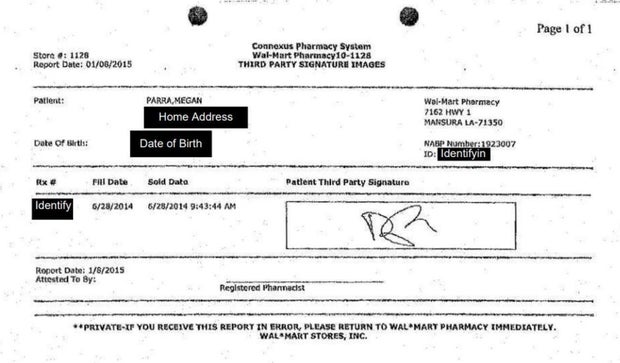
David Begnaud: Dustin signs for scripts at Walmart at 9:43 a.m.
Dan Schaub: OK, yeah.
David Begnaud: So based on this timeline from you, there's no way Dustin could have been at the house when the shot was fired?
Dan Schaub: That's a — uh, uh, uh, a reasonable conclusion, yes.
On Jan. 15, 2015, Dan Schaub released his eight-page report, also concluding that Megan "died of a self-inflicted gunshot wound."
Ducote did not buy Dan Schaub's timeline, which he had based on the neighbor who reported hearing a gunshot around 9:15 am. But Schaub's report ended up being a gift. Ducote now had those 115 photos taken the morning of Megan's shooting—and his investigation was about to ramp up.
Steve Ducote (showing Begnaud a photo): This, you know, caught everybody's attention.
THE FAMILY FINDS CLUES IN THE PHOTOS
Commander Dan Schaub's conclusion that Megan Parra likely shot herself, was yet another blow to the Ducote family's theory that she may have been murdered by her husband, Dustin Parra. But Schaub's report did provide some valuable clues, says Steve Ducote.
Steve Ducote: That report came with some blurred pictures.
So Steve Ducote tracked down the officer who took the photos, Dave Blanchard, and it turns out he still had the originals. He never deleted them from his camera.
David Begnaud: Why did you save them?
David Blanchard: Because it was evidence. … I don't know. It stuck out. … Suspicious.
Charles Riddle: He thought that there were some things that weren't resolved in the investigation.
Blanchard gave the digital images to Avoyelles Parish District Attorney Charles Riddle, and Riddle shared them with an insistent Steve Ducote.
Steve Ducote: I said … "I'm not leaving without those pictures."
David Begnaud: Did you go through all the … photos?
Betsy Jeansonne: Yes.
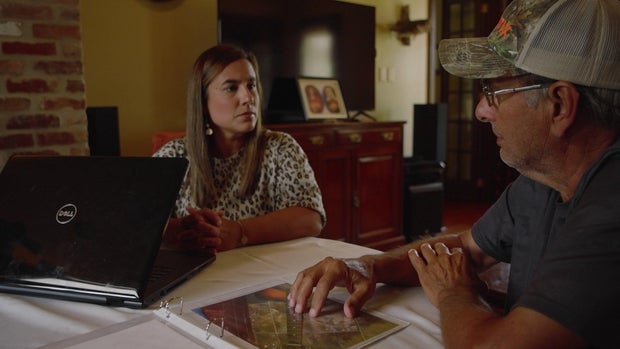
Steve Ducote and his daughter Betsy Jeansonne began studying those 115 photos from the day Megan was shot.
Betsy Jeansonne: And I've had a lot of people ask me … how could you look at those crime scene photos of your sister?
David Begnaud: Yeah.
Betsy Jeansonne: And I'd say, she'd have done it for me.
Jeansonne says she also spent hours on the internet studying blood spatter patterns, because something about the blood around Megan just didn't look right to her.
Betsy Jeansonne: You can see the blood spatter where it should have been on the exit wound side.
Steve Ducote: Mm-hmm.
Betsy Jeansonne: It's actually on the entrance wound side. And there's no spatter on the exit wound.
Steve Ducote: There's always more exit wound blood than entry wound blood.
Steve Ducote was beginning to believe that his daughter had been rolled over, after she was shot. Also troubling to him was that seemingly clean gun—Dustin Parra's gun, which Ducote says should have had blood on it.
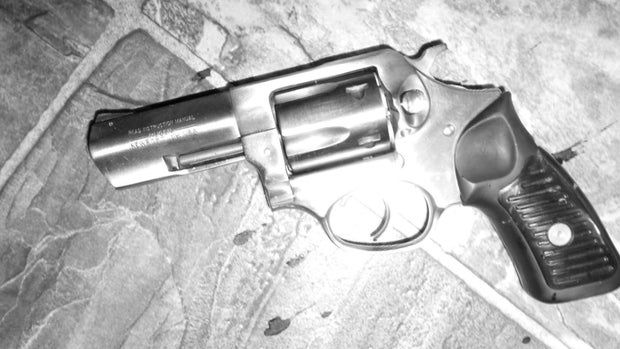
To Ducote, it appeared that the gun had been wiped clean. Then there was that picture of Megan's boys, that Dustin discovered in her pocket. Ducote believes it was Dustin who put it there in the first place.
Steve Ducote: If you gonna make it look like suicide, you're going to do things like that.
Ducote also thinks Dustin planted the alleged suicide note, and firmly believes it was not even written by his daughter.
Steve Ducote: She never wrote in solid print. She'd write mixed, print, script, print, in the same word.
Some of the photos revealed clues of a struggle says Steve. Like a wine rack found behind a chair, and this guitar lying on the floor.
Steve Ducote: I think they were fighting.
Several months later, Steve Ducote circled back to District Attorney Riddle and showed him some of the photos that concerned him.
Charles Riddle: And as I looked at it, I kept saying … "this can't be what was found to be a suicide."
Riddle says he tried to get the sheriff's office to take another look at the case, but they refused.
Charles Riddle: The local police department really didn't have the capacity. So, we tried to get state police to look into it and they didn't seem to be interested.
So, Riddle went to then-Avoyelles Parish coroner Dr. L. J. Mayeux — who had issued Megan's death certificate. Based on the medical examiner's report, Mayeux had classified Megan's death a "suicide." Riddle tried to get him to change it to "undetermined."
David Begnaud: Why did you want that?
Charles Riddle: So that we could open up an investigation. … And we started showing him some of the photos … And, uh, he said, "hey, I'm convinced that we — it ought to be reopened."
Mayeux reviewed Knight's one-page report.
David Begnaud: What do you know about Chris Knight's investigation of this death?
L.J. Mayeux: Sloppy and very questionable.
Mayeux says he found out that Knight had not even attended Megan's autopsy. But the former corner admits that his office also did not conduct much of an investigation.
David Begnaud: Did you ever interview the husband?
L.J. Mayeux: No, sir.
David Begnaud: Why not?
L.J. Mayeux: We couldn't find him.
David Begnaud: Did you try calling him?
L.J. Mayeux: Yes. No answer.
In 2017, Riddle sent a letter written by Mayeux to the Louisiana State Police, requesting a review of the case. In the letter, Mayeux wrote, "I was informed that there were photographs … which I had not seen …" and "many questions are unanswered." The state police did agree to look at the case.
David Begnaud: What came of that?
L.J. Mayeux: The state police found no evidence to overturn the initial findings.
By now, Dustin Parra had moved on. He married his second wife, and they were raising Megan's sons. But Steve Ducote could not move on, and he called an old high school buddy for help: David Lemoine, a highly respected FBI agent who was now retired and living in Nebraska.
David Begnaud: What'd you tell him?
Steve Ducote: I said I need some help. … I need to find out who did it.
In 2018, more than four years after Megan was shot, David Lemoine flew to Cottonport to spend time with his brother, Peter Lemoine, and to take a meeting with Steve Ducote.
Steve Ducote asked his old friend to review a binder filled with photographs and documents, says Peter Lemoine.
Peter Lemoine: He came to my house that night, spent hours and hours just sifting through the evidence. And by the next morning, he went to Steve's house and said … "Your daughter was murdered."
FORMER FBI AGENTS TAKE A NEW LOOK AT THE CASE
Peter Lemoine: I'd always tell Steve … "as long as my brother is in this case, you're going to be OK."
Peter Lemoine remembers the day in 2019 when his brother, former FBI agent David Lemoine came out of retirement, determined to help Steve Ducote get to the bottom of his daughter Megan's death.
Peter Lemoine: Once David Lemoine knew that that girl was killed, nothing was going to stop him.
Zack Shelton: He was fired up when he called me.
Zack Shelton got a call from his friend and fellow retired FBI agent asking for help.
Zack Shelton: And when I reviewed the file … there was something there. There was no doubt in my mind that we were headed in the right direction.
Steve Ducote: I had no help. Very little help. … Then, I had the best I could ever get.
But to dig into the case, the former FBI agents needed new badges. So, they turned to one of the only local law enforcement officials willing to help. At the time, Earnest Anderson was Cottonport's police chief. He agreed to reopen the case, and to deputize David Lemoine and Zack Shelton.
Zack Shelton: And he swore us in as Cottonport … police officers. And that gave us the authority to look into it.
Then-Assistant Police Chief Justin Chenevert asked to be assigned to the case. He strapped on his bodycam, and helped two seasoned investigators interview witnesses.
On Jan. 15, 2019, the original detective on the case agreed to talk. By then a police officer in a neighboring town, Chris Knight said that on the day of the shooting he felt overwhelmed and called for backup. Among others, Chad Jeansonne, a well-known detective and blood spatter expert showed up, and Knight says Chad Jeansonne told him it was clear, Megan had shot herself.
CHRIS KNIGHT (police interview): The way the body was positioned and the blood splatter and the gun that it actually was a suicide.
But on a recorded interview, Chad Jeansonne disputed Knight's account.
CHAD JEANSONNE: What Detective Knight basically wanted to know was … could I determine if this was a suicide or not? I said, no, it's not that simple.
Chad Jeansonne says he told Knight that the scene was badly contaminated — and he advised Knight to investigate closely, until he could rule out homicide. But Knight admits he never even sent the gun out for testing:
DAVID LEMOINE: Why not?
CHRIS KNIGHT: I have no idea.
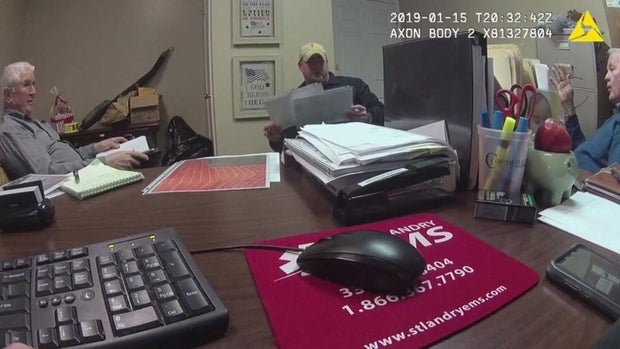
And Knight said he had never fully examined the evidence:
CHRIS KNIGHT: Because I looked at it as a suicide and not homicide. …
CHRIS KNIGHT: If I botched this, you know, then I mean, I'll take the butt — my fault, you know? But was it done — but was it done on purpose? Absolutely not.
Knight repeatedly refused "48 Hours"' requests for an interview, but did send a written statement, which reads in part: "I was a young, inexperienced investigator," and "Would I do some things differently today? With the training and experience I now have, absolutely." Shelton and David Lemoine were now working hard to do better—and did something Knight never had.
JUSTIN CHENEVERT: Go ahead and state your name for me.
DUSTIN PARRA: Dustin Parra.
They questioned Dustin Parra extensively, for more than an hour.
ZACK SHELTON: Was there any arguing going on, any fighting going on?
DUSTIN PARRA: Not in — not anything that a normal married couple would go through.
Dustin said that in the weeks leading up to her death, his wife had seemed depressed, and obsessed with the question of where young children go when they die.
DUSTIN PARRA: In the middle of the night, she'd come wake me up. I can't stop thinking that my kids wouldn't go to heaven if something happened to them.
Steve Ducote: Dustin's the only one who said that. … She never mentioned it to anybody.
Zack Shelton: What never made sense to me is, if he thought she was going to commit suicide … it was no way he would have left his wife alone to go to Walmart.
And what about those rumors of infidelity?
ZACK SHELTON: Did you have affairs?
DUSTIN PARRA: Yes …
ZACK SHELTON: Did she know about it?
DUSTIN PARRA: To my knowledge, no, because she didn't question me.
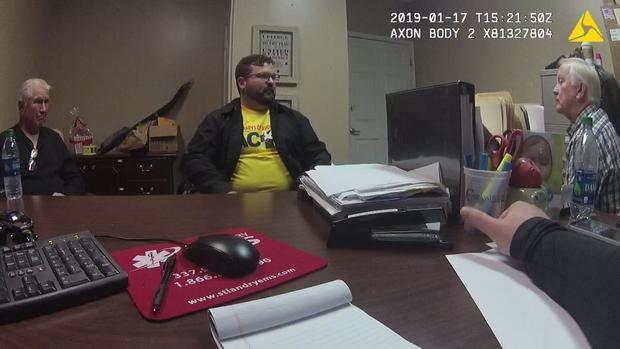
Also troubling to David Lemoine and Zack Shelton was the way Steve Ducote described Dustin sliding into Megan's blood.
Steve Ducote: He came running in from the garage door … he gets in a baseball slide position, and he slides.
DUSTIN PARRA: I slipped in a pool of blood at her — at around her head.
Dustin said it was an accident. But Shelton did not buy that.
Zack Shelton: What better thing to slide in, right in the blood. And disrupt the crime scene.
Dustin was also asked about the alleged suicide note, which Lemoine and Shelton were now convinced had been planted by Dustin himself.
DAVID LEMOINE: Somebody planted this note after she died, who could that have been?
DUSTIN PARRA: I really don't know.
Dustin repeatedly denied having anything to do with Megan's death, or any sort of coverup:
DUSTIN PARRA: I feel like y'all trying to incriminate me.
DAVID LEMOINE: You need to come clean, and you need to say, we got in a fight and maybe she grabbed the gun first …
ZACK SHELTON: Maybe she shot herself in front of you. I don't know, but you were there.
DUSTIN PARRA: When she was shot, I was not there.
David Lemoine pushed so hard that Dustin abruptly ended the interview:
DUSTIN PARRA: All right, I'm done guys.
Zack Shelton: In that moment … I'm thinking he's definitely involved. … See, this is early on.
Shelton and David Lemoine also interviewed Anne Guillory, the neighbor who thought she may have heard a gunshot early that morning:
ANN GUILLORY: A little after 7 a.m., I heard a boom (claps hands), a loud boom.
DAVID LEMOINE: And you clearly heard it?
ANN GUILLORY: Oh, yes, it was very loud 'cause I said to myself, "Oh my gosh, that was a loud noise."
Zack Shelton: We also have a guy on the left side that said he had heard a gunshot around 9:20 … but he wasn't sure if it was a gunshot.
Zack Shelton and David Lemoine were convinced, that Anne Guillory, the neighbor to the right, heard the shot that killed Megan a little after 7 a.m., leaving Dustin plenty of time to shoot his wife and cover up his crime, then drive to Walmart. But their case was purely circumstantial, until a forensic expert hired by Steve Ducote discovered what he believes to be the physical evidence connecting Dustin Parra to the shooting.
Missy Ducote: Puts him there. Puts him there when my daughter was shot.
AN EXPERT DISCOVERS KEY EVIDENCE
It was now 2020, and Zack Shelton and David Lemoine were feeling confident about the case they were building against Dustin Parra. Then, says Peter Lemoine, as COVID-19 hit the U.S., the deadly virus killed his brother David Lemoine on Dec. 28, 2020.
Peter Lemoine: I made up my mind at that very time that, I was going to finish what he started.
Betsy Jeansonne: Mr. Peter just literally picked up where Mr. David left off.
Zack Shelton and Steve Ducote now had a new partner, a highly respected local attorney.
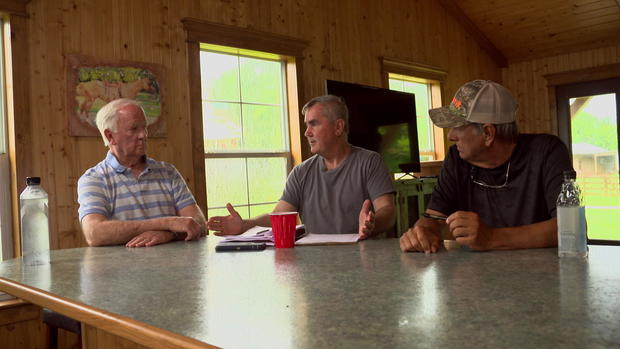
Steve Ducote: Went to work on it as hard as any human could have worked on it, you know.
Peter Lemoine says his main job was to keep their case in front of District Attorney Charles Riddle.
Peter Lemoine: In an effort to make sure that it was aggressively prosecuted. … What he told me was … we need more.
So, Steve Ducote asked the Jefferson Parish Crime Lab to examine the evidence and check for suspicious blood spatter on Dustin's clothing. The lab found no evidence of murder, or any evidence Dustin was there when the gun went off. But Ducote was still convinced that Dustin had shot Megan and had purposely slid into her blood to cover up any incriminating spatter. So, in April 2021, Ducote hired an independent crime scene analyst named Eric Richardson.
David Begnaud: Can you show me the blood spatter?
Eric Richardson: Yeah. … OK. So, when you look close, you see these very, very small misting pattern right here.
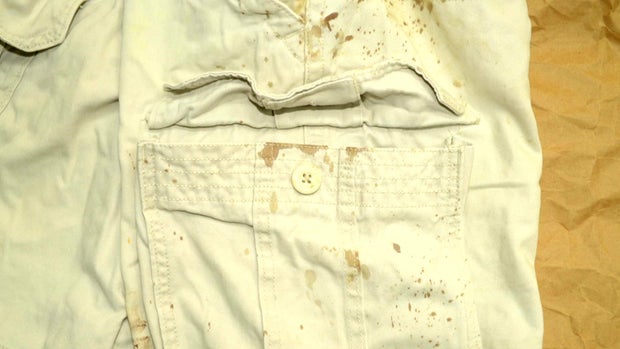
Richardson examined photos of the shorts worn by Dustin Parra—and he homed in on a fine mist of blood right under a pocket flap. It's a pattern he says can only be caused by high velocity blood spatter from a gunshot wound.
Eric Richardson: It told me that Dustin was there when that gun was discharged into Megan's head.
David Begnaud: You sure?
Eric Richardson: Positive.
Betsy Jeansonne: It was concrete, concrete evidence.
Peter Lemoine (to Shelton): We proved he was in the room next to her. We know that it was his gun.
Zack Shelton: The only explanation is that he killed her.
Eric Richardson also agreed that the gun looked like it had been wiped clean. On Oct. 13, 2021, Riddle took the case to a grand jury.
David Begnaud: Six minutes after you present it to the grand jury, they come back with a charge of?
Charles Riddle: Second-degree murder.
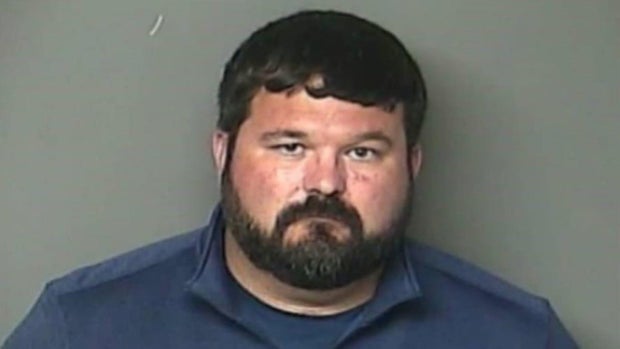
Dustin was arrested, pleaded not guilty, and was released on bond. Based on the blood spatter that Richardson found on Dustin's shorts and the charges, the medical examiner revised Megan's autopsy report, and changed the manner of death from "suicide" to "undetermined." Riddle prepared for a now nearly nine-year-old case to go to trial.
Charles Riddle: We believe she was shot about 7:30.
David Begnaud: You think he left her there while she was still alive?
Charles Riddle: Oh, I know he did. Yeah.
But it was not an open-and-shut case says Riddle. He says experts from the State Police and the Jefferson Parish crime labs were going to be called by the defense and told him they would be testifying that the blood spatter on Dustin's shorts did not prove he was present when the gun went off. And then there was Megan's note to her sons. A handwriting expert hired by Steve Ducote was going to testify that it was most likely written by Megan. But Riddle says he was prepared to argue that it was not a suicide note.
Charles Riddle: I thought that she was just leaving him.
There was also the difficulty of proving what time Megan was shot, where Dustin was when it happened and how long Megan could had been lying on the floor before Steve and Missy Ducote discovered her still alive.
David Begnaud: You know the damage it did to her brain, right?
Charles Riddle: Oh, God, yes. … I'm surprised she was still alive. Yeah.
David Begnaud: What could you see the defense making hay of successfully?
Zack Shelton: They were gonna make hay over the accident the night before. … they were gonna say that she tried to commit suicide the night before.
On Friday, March 24, 2023, just three days before Dustin Parra's murder trial was set to begin, Riddle says his phone rang.
Charles Riddle: I get a call from the defense attorney. … He said, well, "I want to offer a plea. … Negligent homicide."
Negligent homicide in the State of Louisiana is not defined as a crime of violence, and only carries a sentence of up to five-years.
Peter Lemoine: David, it was an awful deal. If all you gonna get is negligent homicide, you're not risking much at all by going to trial.
Steve Ducote: I was concerned that he could … walk away a free man. Never clear her name for those boys … and they never know the truth.
The Ducotes said they would agree to a deal, but only if Dustin answered some very specific questions. On March 26, 2023, Dustin Parra pleaded nolo contendere or no contest to negligent homicide, and Riddle got to question him on the stand. Riddle read to "48 Hours" from the record.
CHARLES RIDDLE (reading): "Your marriage to her was a struggle for the last couple of months of her life, correct?" Answer by Parra, "yes, sir." "On the morning of June 28th, 2014, you and her were arguing and she threatened to leave, correct?" Parra, "yes. I'm not contesting this part of the nolo contendere plea." … "You had a pistol in your hand and in the struggle, the gun went off firing into her head, correct?" Answer, "yes. I'm not contesting this part of the nolo contendere plea."
Charles Riddle: We wanted to make sure that he admitted that he shot her, and it was not suicide.
Steve Ducote: To us, as a family, him admitting to that, that was huge.
David Begnaud: You all weren't done. What was the last and next thing you wanted to do?
Missy Ducote: Get those boys.
Dustin had full custody of his and Megan's sons—and he'd had it for nearly nine years. They lived with him and his new wife.
David Begnaud: You wanted full custody?
Missy Ducote: Full custody.
David Begnaud: Stripping him of his rights?
Missy Ducote: Full custody.
David Begnaud: And you got it.
Missy Ducote: And we got it.
On April 20, 2023, Missy and Steve Ducote were granted full custody.
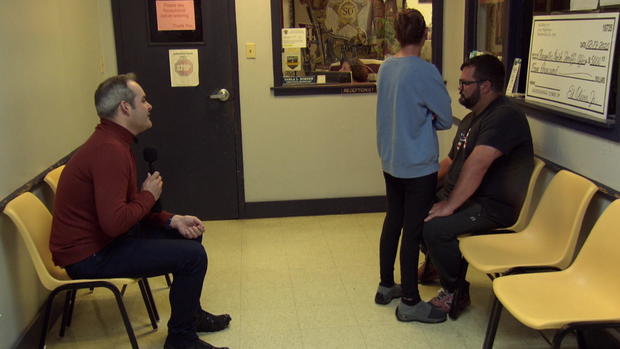
Seven days later, "48 Hours" was there when Dustin and his wife arrived at the sheriff's office so that Dustin could turn himself in.
David Begnaud: Dustin, we tried to reach you. I wanted to get your side. I wanted to hear from you. … People are going to watch this and they see your silence. … Silence is all you're leaving us with.
Dustin never said a word.
David Begnaud: I do wonder what you think Megan would say to you at the conclusion of all of this if she could.
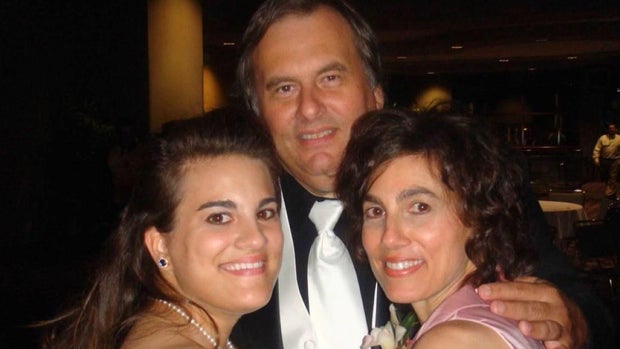
Steve Ducote (emotional): She'd say, take care of those boys, and probably say thanks for not giving up.
Missy Ducote: God blesses those who hunger and thirst for justice, for they will be satisfied. Am I satisfied? … If I know Meg's OK up there alongside Jesus and all the angels … But in my heart … she'll be forever 29.
Megan Parra's death certificate now lists her manner of death as homicide.
Dustin Parra will likely serve 18 months in prison and the remainder of his five-year sentence out on parole. His nursing license has been permanently revoked.
Produced by Judy Rybak. Emily Wichick Hourihane is the field producer. Anthony Venditti is the content research manager. Shaheen Tokhi is the associate producer. Jud Johnson and Grayce Arlotta-Berner are the editors. Anthony Batson is the senior broadcast producer. Nancy Kramer is the executive story editor. Judy Tygard is the executive producer.

